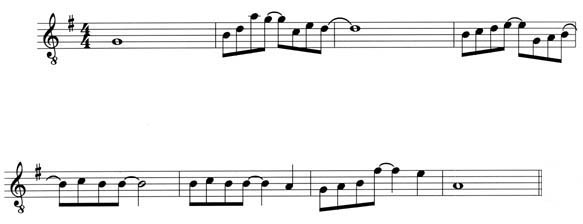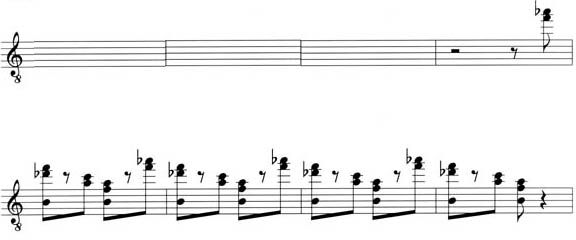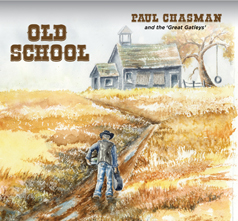Melody - August 3, 1999
 I
would like to state the obvious: Melody is important. I
would like to state the obvious: Melody is important.
Please bear with me while I try to explore the subtleties of this statement that maybe are not so black and white. Melody is the story that the music tells. If you write a novel, you can have interesting characters, a picturesque atmosphere, and lovely descriptions, but without a story, there is nothing to pull these pieces together. In music, we might create an interesting rhythmic structure, an array of atmospheric sounds and moods; but without a strong melody, we lack the substantial glue to hold these elements together. When I refer to melody, I am not only talking about a sixteen-bar pop song that sticks in your mind like a corn kernel between your teeth. Going back to my analogy of a novel, most novels don't have just one story that goes in a straight line. Most good novels have a plot, sub-plots, and several themes, all of which intertwine, emerge at varying paces, take turns at center stage, and eventually converge to tell the bigger story. We can substitute the word "melody" for "plot" in the above statement, and we are now talking about music. A melody can be simple or complex. It can be straightforward or fragmented. It can be beautiful or jarring. It can be singable or singable only by Bobby McFerrin. But a melody must be defined. A melody needs contour. A melody needs forward momentum and direction. A great melody has a sense of inevitability; it sounds as if you've heard it a million times, yet it is totally original. Listen to the first eight bars of Here, There, and Everywhere by Lennon and McCartney : Ex: 1
When you look at the sequence of notes, it is easy to see the shape of the melody, even if you don't read music. The line is continually moving forward; each phrase is an answer to the last while creating expectancy toward the next; the sum of these eight bars is a finely crafted, distinct musical statement. Let's look at an entirely different example. I believe that a common misconception about "modern" music is that it is formless and random in structure. To my ears, great modern music uses many of the same principles as pop, folk, jazz, and early classical. The main difference is that it is more complex. Sergei Prokofiev created ingenious melodies. When I transcribed his 7th Piano Sonata for guitar, I was astounded to uncover his architectural craft. He begins the first movement by laying out three themes consecutively, as if to say, "Here is what this story is going to be about..." He then proceeds to vary them, shape them, and intertwine them through the entire movement. (The piece was written in key of Bb, but I will use examples from my guitar transcription, which is in key of E.) First he says: Ex. 2
After doodling briefly with his first statement, he says: Ex: 3
He plays with the second theme for a bit, building tension, and then goes on to his third theme: Ex: 4
Prokofiev has now set the table. On it he has laid three distinctive melodic statements. For the next ten minutes, he will toss them around, build on them, jump off from them into new themes, and create countless permutations, all the while creating forward momentum and tension with a relentless rhythmic drive. Here are some tips to consider when crafting a melody: 1) Have a purpose for every note you play. As I said, a great melody sounds inevitable. Eliminate extraneous notes. Shape the melody until it says exactly, not approximately what you are trying to say. 2) Create forward momentum. A good rhythmic drive will help. Also, avoid relying on the tendency to make a one-bar statement, followed by a one-bar response, followed by the same one-bar statement, followed by another one-bar response, followed by Statement I again. (I, IA, I, IB, I, IC.) This structure works great for blues but to try to build a whole musical composition around it gets pretty boring. Instead, try to unfold the melody like a flower. Make each phrase new while still evolving out of what has preceded it. 3) Play with intervals. I have written many pieces that started out going up or down a scale, and by creating alternate routes from Point A to Point B rather than going in a straight line, I was able to come up with more interesting melodies. 4) Play with rhythm. You may have a line of quarter notes, and simply by changing the rhythm of those notes, you will give more distincton to your melody. 5) Create the melody before the chord structure. As guitarists, it is easy for many of us to come up with a chord progression, and then loosely build a melody around it, relying on the chords and rhythm to hold things together. Try writing a melody first, and then create your harmony and rhythm around it. 6) Build melodies out of your melody. Listen to your theme and see if there are phrases that suggest new directions.. Consider each phrase as a jumping off point for a new melodic idea. 7) Don't flaunt your composing technique. An evolved player does not show off his or her speed and dexterity. He/she uses technique as a means to facilitate the music. The same principle should apply to composing. Rather than holding up a sign saying, "NOW I AM IN 7/8 TIME," or "NOW I AM USING A WHOLE-TONE SCALE," it is more effective to integrate those devices so naturally that the listener doesn't even know anything out of the ordinary is happening. Technique is the hammer and nails. Music is the house. 8) Look for memorable moments. Hopefully, your piece will have moments when it feels like something special is happening. Look for those. Find the most effective ways to frame them, spotlight them, and return to them in variations throughout the piece. 9) PLEASE...Have a sense of humor. This is my own personal request. A sense of humor is an important tool in getting through life. Then why is it, as musicians, so many of us take ourselves so seriously ? I'm am not advocating hardy-har-har all the time, and I'm certainly not suggesting that you force humor when it's not there, but if you open up to your lighter self, you and your audience might have some fun. 10) Be distinctive. You have an incredible freedom to go anywhere you want to go with your music. There are infinite possibilities. Take advantage of your freedom to go where only you are able to go, to say what only you can say, and to experience the joy of expressing the thoughts and feelings that are uniquely yours. BACK TO ARCHIVES |





